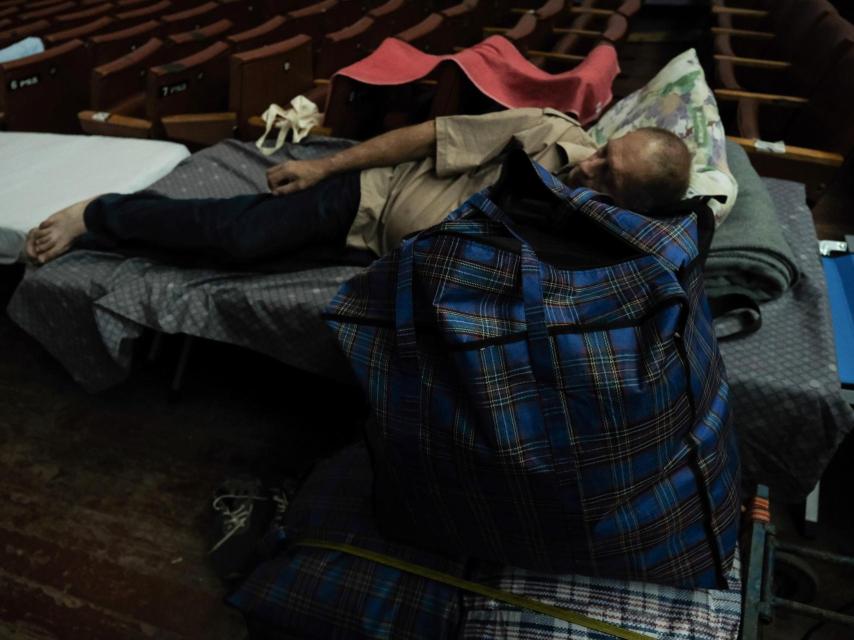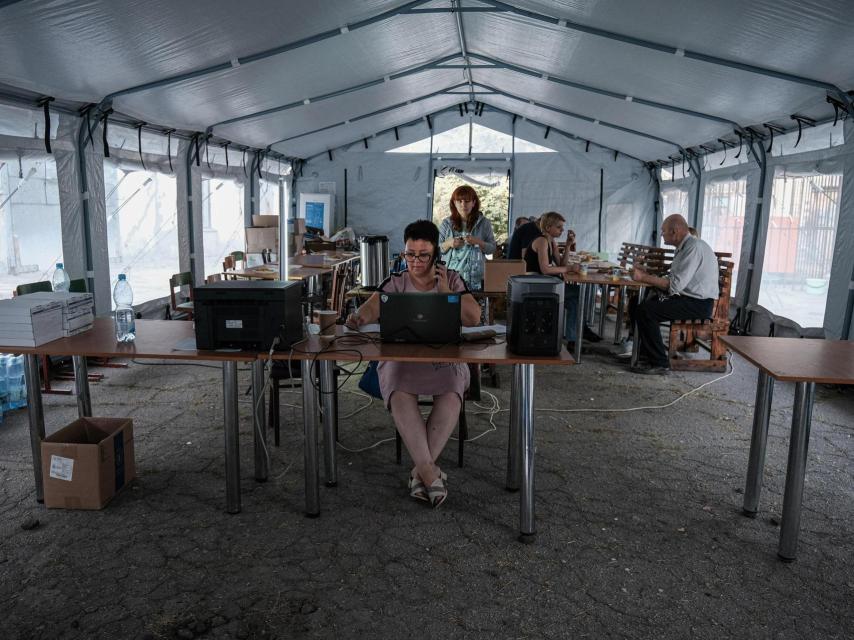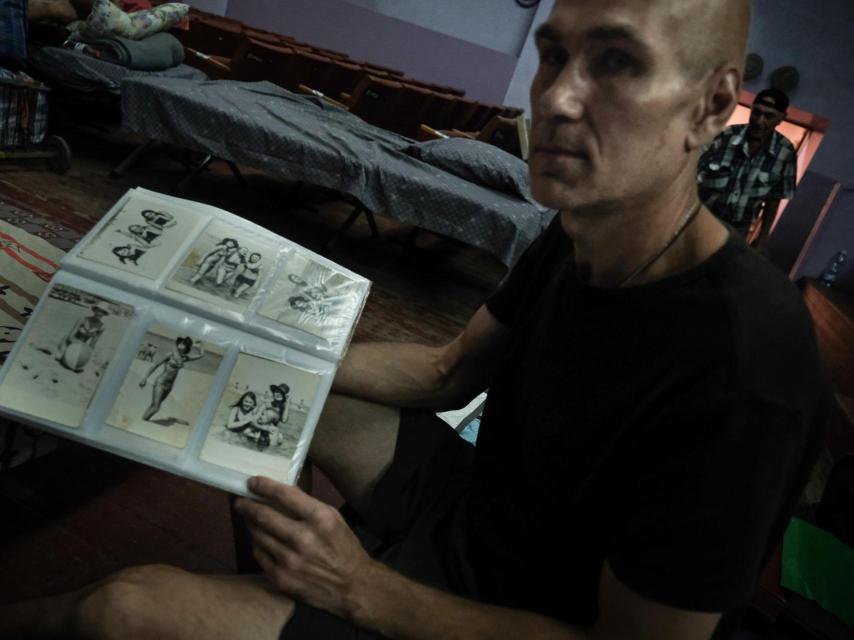“Here are only those who have nowhere to go”says Victoria as she shows me the dozens of beds, arranged in rows, that have been installed on the stage of an old theatre in Pavlograd. In the stalls, they have also removed the seats in the central part, to accommodate more mattresses. And in the dressing rooms and offices of the building. They cannot cope with the flood of evacuees that the volunteers are taking by road from the city of Pokrovsk.
“We have turned these facilities into a transit centre, the evacuees can stay here for several days until volunteers or the administration find them a place where they can settle,” she continues explaining, exhausted after several days working “from 7 in the morning to 11 at night, because they arrive by the hundreds.”
“Those who have relatives in other, safer cities, or the resources to rent somewhere, continue on their way to Dnipro, kyiv, Lviv or even Poland. Only the most helpless remain here“, he laments.
The old Pavlograd theatre was converted into a transit centre a few weeks ago.
The Spanish
In the old theatre there are families with children, there are even babies, but mostly there are older people. Looking at their faces you can see the feeling of uncertainty that runs through them after having lost their home. Some are from Pokrovsk, others from the villages in the region – even closer to the Russian lines, which in recent weeks have advanced faster than anyone imagined.
Evacuations in villages like Selydove, Ukrainsk, Kurajovo or Toretsk are hell for volunteers and police. They have to travel in armoured vehicles, because artillery duels are constant, and they have to search for people in cellars and shelters. And in some of these places there is no longer any telephone signal, because of the destruction caused by the bombing, so it is even more complicated.
“If you want to see hell, go to Ukrainsk”“It’s terrible, the bombings, the dead,” says a woman in her fifties, sitting on one of the beds on the stage of the theatre. She and her son also had to be taken away in an armoured vehicle. “It’s terrible, the bombings, the dead,” she insists. And she is not the only one who talks about the terrible situation in these places.
Fleeing from the bombings
But the journey begins long before reaching the old theatre in Pavlograd. It starts more than 100 kilometres back, at an evacuation point in Pokrovsk. There, people from all the surrounding villages are gathered together to be taken out of Donbas by road. And many of them began their escape even earlier.
“I sat in a basement for 20 days until they found me”“She was a bit worried,” says an elderly woman, waiting to board one of the evacuation buses driven by volunteers. Her name is Raisa, she is 83 years old, and her grandson spent weeks searching for her until they found her underground. When she was taken out, urban fighting – between Russian and Ukrainian troops – had already begun in her village, Ukrainsk.
Along with the elderly Raisa, ten other people are preparing to evacuate Pokrovsk. Liudmila, 61, has stayed in the city as long as she can because “she had a good job here in the financial sector.” There is also a young couple, who hugs their baby tightly every time they hear the echo of Russian artillery in the distance.
The mother, Marina, is only 18 years old, but she speaks with surprising maturity. “We have lived half our lives at war, because the war in Donbas started in 2014, but we were never afraid… until the baby arrived. It’s scary now, and we need to think about her before ourselves.“, says.

A man rests in the space reserved for evacuees.
The Spanish
A few seats back are Vasily and his wife Natalia, aged 79 and 73. They decided to leave when a shell hit the house next door. Further back, another young woman with mobility problems is travelling with her mother, another elderly woman, and a married couple with their cats. I decide to board the bus with them, and as we pull away and leave Pokrovsk behind, I see that none of these people can hold back their tears.
They have lost their homes, their jobs, their friends. They have lost the life they knew, the life they clung to no matter what.80 percent of these people are fleeing because they no longer have a home to stay in: Russia has bombed it.“Or the house next door was bombed and they had to survive in basements,” explains Misha Lutsenko, from the NGO New Generation Children, which is coordinating the evacuation.
There are more volunteers like Misha from many other associations at the evacuation points, as well as police teams helping civilians as the situation in Pokrovsk deteriorates. In the last month alone, more than 20,000 people have been evacuated – up to 2,000 people a day, 10 percent of whom are children.
Train cancelled
A few months ago, it was unthinkable that the city of Pokrovsk would fall under Russian occupation, but today it is a very real possibility. More than 60,000 people lived in this city, and it was an important logistical hub – not only for the army – because it was where the rescue and emergency services that assisted the victims of the Russian bombings in the region were concentrated. Firefighters and special police forces were also present.
There was work, commerce, medical centres and it was a communications hub. Even today, and despite the fact that Russian troops are less than ten kilometres away, some shops are still open and residents take city buses to get around the city – with the sound of shelling echoing every few minutes.
There are more than 17,000 civilians left in Pokrovsk – and another 10,000 in surrounding villages – and although The Ukrainian Army has launched a counteroffensive in this part of the front to try to contain the enemy advance.the authorities’ recommendation is to evacuate. Every morning, since August 17, a text message has arrived on the phone of all residents urging them to evacuate and providing the phone number and social networks where they can get help to do so.

Volunteers register evacuees from Donbas in a tent that Caritas has set up next to the transit centre.
The Spanish
Until last week, most of these evacuations from Pokrovsk were carried out by train. But the threat of Russia launching a missile at the station – as it already did in Kramatorsk, in the midst of the 2022 evacuations – forced the cancellation of this route and left the only option to leave by road.
No one speaks on the bus with Raisa, Liudmila, Marina or Natalia. Almost all the evacuees stare into space through the glass windows, and even though they have managed to hold back their tears, they sigh a few times. Every now and then a mobile phone rings: relatives asking if they have left Donbass yet, if they are safe now.
Upon arrival in Pavlograd, everyone gets off the bus to register in the computer system, and receive the relevant state aid afterwardsIn fact, as I speak to volunteer Victoria at the door of the old theatre, more and more buses keep arriving.
From one of them they are taking down a man of about sixty, who is suffering from an anxiety attack. His wife is crying silently beside him, without letting go of his hand. The dignity with which these people bear the human drama of losing everything – and fleeing from the rubble of their bombed-out house – is worthy of admiration.
Clinging to memories
I stay with them to spend the night, with those who They have nowhere to go and temporarily settle on one of the beds in the old theater.Raisa, Liudmila, Marina and the other bus passengers continue their journey to Dnipro after having quickly checked in.
The volunteers greet the man with the anxiety attack and the twenty other people who have arrived in the last few minutes more calmly. They talk to them for a long time, hold their hands while listening to their stories and try to offer them a little comfort before showing them to their bed.
All the volunteers are young people – between 20 and 30 years old – but they play a crucial role in the midst of this humanitarian crisis. In addition to completing computer records and attending to the needs of the Ukrainians staying at the transit centre – providing medicines, food, hygiene products – they take the time to listen to them.
Many of the people who approach them are elderly people, who do not need anything, but who want to talk. Sometimes they break down in tears, other times they share a joke, or ask them unimportant questions. But They listen to everyone with a humanity that pierces the soul..

Dimitri shows his photo albums in the old theatre in Pavlograd.
The Spanish
Inside the theatre, the stories are more intense than those in any script written for the stage. Several evacuees – seeing the camera hanging around my neck – also come up to talk to me. One of them is walking with a crutch. “A week ago I buried my mother, and three days ago I had a hip operation,” he says by way of introduction. “Come, I want to show you my photo albums; you won’t regret it.”
Sitting on one of the beds, the man – whose name is Dimitri and who is 49 years old – takes out perfectly wrapped volumes of photographs. He has had to pack his life into a couple of bags, and his most precious possession is these photographs. His memories. That is all he has left of his half-century of life in Donbas.
There are very old black and white photographs of her mother when she was a child, of her grandfather. “He worked on a nuclear submarine,” she explains, “and died very young from being exposed to radiation for so long.” Her mother was a pianist and worked in a cultural centre, very beautiful and stylish, and she appears in image after image in different places. One of the snapshots was taken in Moscow.
Dimitri also shows photos from his youth, travelling or at the beach. “Where do you want to live from now on?” I ask him. “I would like to continue living in Donbas, but in a peaceful Donbas. And that is not possible”he says. “But in some ways I feel a little better after sharing my story with you,” he adds. “Actually,” I reply, “you’ve just shared your story with a lot more people, even if they’re 4,000 kilometres away.”






![[Img #74784]](https://thelatestnews.world/wp-content/uploads/2025/01/Suffering-abuse-in-childhood-progressively-increases-the-risk-of-suffering-150x150.jpg)








Add Comment